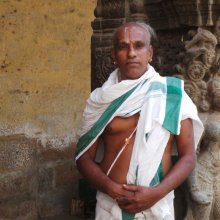Shriramanavami, Śrīrāmanavamī, Shrirama-navami, Śrīrāmanavami: 3 definitions
Introduction:
Shriramanavami means something in Hinduism, Sanskrit, Tamil. If you want to know the exact meaning, history, etymology or English translation of this term then check out the descriptions on this page. Add your comment or reference to a book if you want to contribute to this summary article.
The Sanskrit terms Śrīrāmanavamī and Śrīrāmanavami can be transliterated into English as Sriramanavami or Shriramanavami, using the IAST transliteration scheme (?).
Images (photo gallery)
In Hinduism
Pancaratra (worship of Nārāyaṇa)
Source: archive.org: Catalogue of Pancaratra Agama TextsŚrīrāmanavamī (श्रीरामनवमी) refers to “Rāma’s birthday celebrations”, as discussed in the twenty-fifth chapter of the Agastyasaṃhitā (agastya-suīkṣṇa-saṃvāda edition), an ancient Pāñcarātra Āgama text dealing with the worship of Rāma, Sītā, Lakṣmaṇa and Hanumān.—[Cf. the chapter śrīrāmanavamī-praśaṃsā]:—Every year in the caitra-month. on the ninth day when the constellation Punarvasu is there, the birthday of Rāma is to be remembered. Fasting and a vigil should be observed on the “ninth day,” as well as tarpaṇa-rites. Those who break the fast enjoined will go to hell. Alms-giving is also to be practised On the following day ( i.e., the “tenth day”), Rāma and His retinue should be meditated upon with the dvādaśa-mantra, and then worshipped thrice along with the aṣṭākṣara-mantra. Such muttering of these powerful mantras is itself sufficient to yield great results. [...]

Pancaratra (पाञ्चरात्र, pāñcarātra) represents a tradition of Hinduism where Narayana is revered and worshipped. Closeley related to Vaishnavism, the Pancaratra literature includes various Agamas and tantras incorporating many Vaishnava philosophies.
Languages of India and abroad
Sanskrit dictionary
Source: Cologne Digital Sanskrit Dictionaries: Monier-Williams Sanskrit-English DictionaryŚrīrāmanavamī (श्रीरामनवमी):—[=śrī-rāma-navamī] [from śrī-rāma > śrī] f. the ninth of the light half of the month Caitra (observed as a festival in honour of the birthday of Rāma-candra), [Monier-Williams’ Sanskrit-English Dictionary] (-nirṇaya m. Name of [work])
Sanskrit, also spelled संस्कृतम् (saṃskṛtam), is an ancient language of India commonly seen as the grandmother of the Indo-European language family (even English!). Closely allied with Prakrit and Pali, Sanskrit is more exhaustive in both grammar and terms and has the most extensive collection of literature in the world, greatly surpassing its sister-languages Greek and Latin.
Tamil dictionary
Source: DDSA: University of Madras: Tamil LexiconŚrīrāmanavami (ஶ்ரீராமநவமி) [śrī-rāma-navami] noun < idem. + rāma +. The ninth titi in the bright fortnight of Caittiram, the birthday of Śrī Rāma; ஶ்ரீராமர் அவதரித்த தினமாகிய சைத்திர சுக்கில பக்ஷத்து நவமி. [shriramar avatharitha thinamagiya saithira sukkila pagshathu navami.] (I. M. P. T p. 491.)
Tamil is an ancient language of India from the Dravidian family spoken by roughly 250 million people mainly in southern India and Sri Lanka.
See also (Relevant definitions)
Partial matches: Shri, Shrirama, Rama, Navami, Ramanavami.
Starts with: Shriramanavaminirnaya, Shriramanavamiprashamsa.
Query error!
Full-text: Shriramanavaminirnaya, Ramanavami, Pankuni, Shriramanavamiprashamsa, Dvadashamantra, Ashtaksharamantra.
Relevant text
Search found 3 books and stories containing Shriramanavami, Shreeraamanavami, Shri-rama-navami, Shri-ramanavami, Shrirama-navami, Śrī-rāma-navami, Sri-rama-navami, Śrī-rāmanavami, Sri-ramanavami, Śrīrāma-navamī, Srirama-navami, Śrīrāma-navami, Śrīrāmanavamī, Sriramanavami, Śrīrāmanavami; (plurals include: Shriramanavamis, Shreeraamanavamis, navamis, ramanavamis, rāmanavamis, navamīs, Śrīrāmanavamīs, Sriramanavamis, Śrīrāmanavamis). You can also click to the full overview containing English textual excerpts. Below are direct links for the most relevant articles:
Temples in and around Madurantakam (by B. Mekala)
Sri Adi Kesava Perumal Temple < [Chapter 3 - Temples of Madurantakam Taluk]
Sri Govindaraja Perumal Temple < [Chapter 3 - Temples of Madurantakam Taluk]
Sri Adhikesava Perumal Temple < [Chapter 3 - Temples of Madurantakam Taluk]
Garga Samhita (English) (by Danavir Goswami)
Verses 3.10.31-37 < [Chapter 10 - The Glory of Śrī Girirāja]
Notices of Sanskrit Manuscripts (by Rajendralala Mitra)
